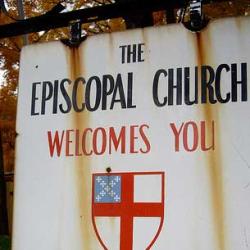 The outcome of last week’s General Conference held by United Methodists was not at all surprising. As I have said in other articles, Protestantism — it seems — is made for schism and our tradition of national conferences or conventions has become a thin veil for the political maneuvering and animosity that is rife in the civic square. Even the ugliness on both sides was predictable. Speakers indulged in epithets and demonization. Denominational leaders who insisted that the church needed people on both sides of the debate over sexuality invited one side or the other to exit, and even before the Conference was over people began taking sides on social media.
The outcome of last week’s General Conference held by United Methodists was not at all surprising. As I have said in other articles, Protestantism — it seems — is made for schism and our tradition of national conferences or conventions has become a thin veil for the political maneuvering and animosity that is rife in the civic square. Even the ugliness on both sides was predictable. Speakers indulged in epithets and demonization. Denominational leaders who insisted that the church needed people on both sides of the debate over sexuality invited one side or the other to exit, and even before the Conference was over people began taking sides on social media.
None of this is characteristic of United Methodists alone. The same dynamics are in play across mainline Protestantism and they have been for some time now.
In a recent edition of The Christian Century, Robin W. Lovin notes that “We have experienced a devastating loss of social capital in the very places that used to be best at creating it.” During the 1960s Lovin notes that many theologians and church leaders assumed that it would be possible to craft a national agenda for the work of the church and even as recently as five years ago he thought it might still be possible to “renew our public discourse,” but he is not so sure about that now.
What to do? According to Lovin, the only way forward may be for the church to set aside its efforts to craft an agenda for the world and embrace a new “Christian realism.” This effort would focus on proclamation “in worship and teaching” as its first priority and would also focus on “forming the church as a community of trust in which people can explore questions about their lives that they cannot ask in the places where those questions concretely arise.” I am convinced that Lovin is right.
Our obsession with national church politics is killing us. National conventions and conferences create a contested space which political activists of every stripe are tempted to seize and control. Spaces of that kind are a zero-sum arena in which people instantly think in terms of winners and losers. Once a group “wins” in that space, the only way to make winning worthwhile is to impose the will of the triumphant party on the life of the whole church. The temptation to coercion is irresistible and (contrary to what every party will say in defeat) neither is immune to that temptation. As a result, defection and disenchantment radiate throughout the system. No one’s opinion is changed and local congregations are drawn into debates over divisive issues without grounding in concrete relationships.
All this happens at a time when Lovin’s “communities of trust” are more desperately needed than perhaps ever before. In his latest book, Alienated America, Timothy Carney points out that the diminished role of faith communities in the lives of Americans has eroded the wellbeing and resilience of communities and individuals. As Carney notes, that wellbeing and resilience cannot be found in in policies and programs from Washington and one might rightly infer that it cannot be found in national church conferences and conventions either.
Building social capital is hardly an adequate mission for the church, of course and Carney, who is a devout Roman Catholic, notes that his book focuses on the sociological impact of churches and not on what they should be or do from a theological point of view. But his work does point to the needs to which the church as the body of Christ ministers: The restoration of relationships with God and with others, the healing of lives, care for those whose lives are in peril, and ways of living that lead to flourishing in Christ’s presence.
National conferences and conventions cannot insure that kind of embodied life. They engage a fraction of any church’s membership. They operate at a level of abstraction that is far removed from congregational life and the relationships that churches nurture. The decision-making process that they rely upon is ill-suited to the task of prayerful discernment. They are, by nature, governed by political forces.
Practically speaking, then, what should we do?
Some have suggested that the way out of the United Methodist conflict is to develop new denominations. Others are talking about new “movements,” and in the case of the United Methodist Church that may be the only short-term firewall available. Many progressive, centrist and traditionalist United Methodists agree that schism may be the only choice, particularly with another bruising General Conference only fifteen months away. But in the long term building new denominations or movements (whatever that might mean) is unlikely to address the absence of social capital that Lovin notes is missing on the national level.
However, this dilemma also illustrates that we have been thinking about the unity of the church in the wrong fashion. Unity does not emerge by imposing it from the top down as part of a programmatic or legislative initiative, and it certainly cannot be nurtured by gathering together a small group of representatives in a conference or convention. Forums of that kind reduce the vast majority of those who belong to our churches to the role of spectator. It is naïve to believe that they are not political and they trade in visions of the church that is strangely disembodied. It is only when such deep and catastrophic differences surface as they did in St. Louis that the vast majority of church members give national meetings of that kind any attention.
Unity grows organically out of the experience of the church as the body of Christ. It is fostered and nurtured through worship, engagement, struggle, mutual care and mission. To put it more prosaically, all church is local.
It is probably unrealistic to sweep away national church structures, and we need to grapple anew with what terms like “connectionalism” and “episcopacy” mean, but it is time to observe a moratorium on national conventions and conferences. The church does not need to be remade from the top down every three or four years. The local church cannot absorb the guidance or rulings of convention-going elites on a regular basis. The agendas that those meetings project onto local congregations is often predictably irrelevant to the trajectory of parish life, and no small number of pastors and congregations regard those gatherings as a distraction or an irrelevance.
It is time, instead, to ask how individual congregations might once again deepen their relationship with God, their neighbors and one another. That will be enough to occupy our time and energy. Our communities need us, and by living into that calling we may rediscover enduring unity.











